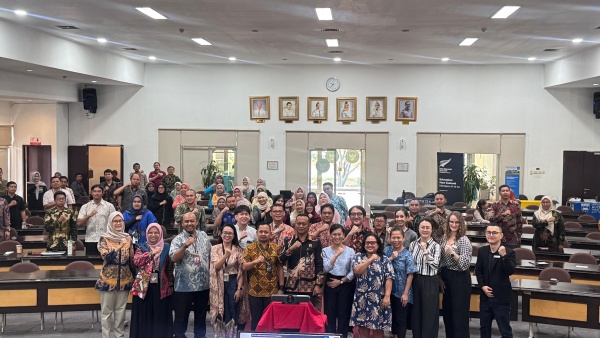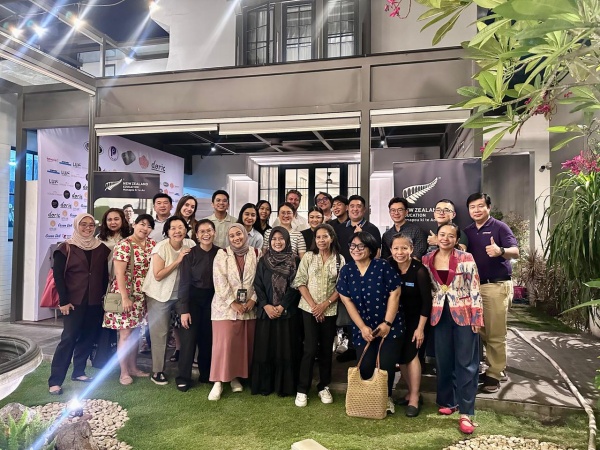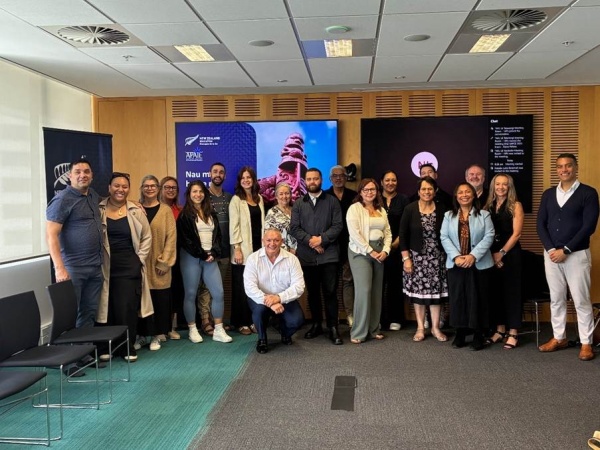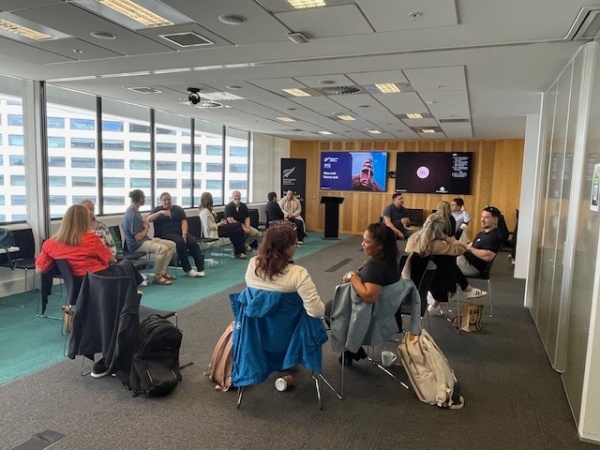Search
Showing 10 of 1877 results for how to register international groups
-
New Zealand universities connect with students and government partners in Indonesia
The programme began with a networking session for school counsellors and visiting New Zealand providers at the New Zealand Embassy in Jakarta, where attendees had the opportunity make connections and meet New Zealand Ambassador to Indonesia, His Excellency Philip Taula.
The following day, a mini fair at Global Jaya International School in Tangerang gave students and parents a chance to speak directly with university representatives about undergraduate study options in New Zealand.
To promote New Zealand postgraduate level study, the group then delivered information sessions at key government agencies including the Indonesian Ministry of Agriculture, the Indonesian Food Authority, and the Indonesian Quarantine Authority.

Attendees of the Indonesian Quarantine Authority information session.
These sessions, held in Jakarta and Bogor, were attended by officials and the Manaaki Scholarships team from the New Zealand Ministry of Foreign Affairs and Trade, and focused on postgraduate programmes and scholarship opportunities.
The roadshow concluded with participation in the Future Fest Expo in Jakarta and Surabaya, hosted by Mata Garuda – the alumni association of Indonesia’s government scholarship agency, LPDP.
Around 400 visitors visited the New Zealand booth to learn more about study and scholarship options.
While in Surabaya, New Zealand universities and ENZ also held a dedicated session with agent partners to share the latest updates on New Zealand’s education programmes, information resources and ENZ ‘New Zealand Taught Me’ campaign collateral to use in their promotions.
ENZ Market Manager Naluri Bella said the roadshow enabled New Zealand providers to engage with a broad range of stakeholders while in market.
“The roadshow helped connect the dots – linking student interest, agent capability, and government priorities in a way that supports long-term partnership between New Zealand providers and their partners in Indonesia,” she said.

-
Indigenous to indigenous education: Shaping global futures together at WIPCE
The conference, hosted by Auckland University of Technology, brought together participants from around the world for rich discussions on how Indigenous knowledge systems and leadership continue to shape global futures. Keynote addresses, panel discussions, and interactive sessions showcased the transformative potential of indigenous-led education.
A major focus of the gathering was to create pathways for mobility and partnership that uplift Indigenous students worldwide.
Attendees explored strategies for student exchanges, co-designed programmes, Indigenous-led research and teaching partnerships, and long-term relationship building across institutions.
These conversations laid the foundation for future initiatives that will enable Māori and Indigenous learners to connect across borders, deepen cultural understanding, and access education that reflects their identities and aspirations.
Beyond the formal programme, WIPCE created space for whakawhanaungatanga through shared kai (food), cultural exchange, and informal connection—reinforcing the relational foundations of Indigenous leadership: trust, reciprocity, and shared purpose.
ENZ Māori Advisor Āriana Ngarimu-Goldsmith represented ENZ in discussions and sessions at WIPCE and said the experience highlighted the strength of collective action.
“There is great power in coming together and uplifting one another, as we work towards a future where indigenous education is centred, valued, and celebrated.”
Pre-WIPCE hui in Tāmaki Makaurau
In partnership with APAIE (Asia-Pacific Association for International Education), ENZ Manapou ki te Ao hosted a pre-WIPCE gathering on 14 November in Tāmaki Makaurau Auckland. The hui brought together indigenous connectors from across Aotearoa, Australia, Canada and USA to share, wānanga, and prepare collectively for WIPCE 2025.
Ngāti Whātua Ōrākei opened the hui with mana and aroha, setting the tone for a day of genuine connection, respect, and belonging.
Attendees shared collective aspirations and challenges within the education systems, reinforcing a collective commitment to tackle structural inequities, elevate culture and identity as foundations for learner success, and strengthen indigenous-to-indigenous connections globally.

Ed Tuari (Manukura – Chief Advisor Māori) facilitated discussions exploring what is front-of-mind for participants as they moved toward WIPCE 2025.

The wānanga format intentionally moved away from “stand and deliver” presentations, instead fostering an open space for reflection, dialogue, and shared learning.
The wānanga format intentionally moved away from “stand and deliver” presentations, instead fostering an open space for reflection, dialogue, and shared learning.
ENZ Manukura Chief Advisor Māori, Ed Tuari, said the events affirmed the power of indigenous knowledge to not only educate, but to transform.
“These engagements remind us that shaping global futures requires indigenous leadership, cultural integrity, and enduring relationships,” he added.
Ko ngā tini aho o te tukutuku whakaniko i te hinengaro
Me tuitui ki te tūmatakahuki o te hononga taketake o te aoBy Rāhera Shortland,
The many strands of knowledge that embellish the mind
Are woven upon a lattice of Indigenous connectivity across the world. - Home
-
EdTech World Tour in New Zealand
The Franco-German researchers have been assessing global edtech trends and ecosystems which support edtech adoption and innovation, and will present their findings to the EdTechXEurope conference in June.
While the US dominates the edtech sector Svenia and Audrey were curious to find out and report on what is happening in other parts of the world. Their Edtech World Tour started in France in October 2015 and included the United States, Chile, Australia, Korea, India and South Africa.
Education New Zealand Business Development Manager, Adele Bryant, hosted Svenia and Audrey’s visit to New Zealand from 7-14 December 2015 between the Chilean and Australian leg of the tour. During their time here, they visited education institutions, edtech companies and government agencies in Auckland, Wellington and Dunedin, recording what they saw and heard on their social media platforms.
From an inspiring Point England School in Auckland, to a Wellington edtech community meetup, and on to Dunedin’s ADInstruments and its high quality life sciences educational products, Audrey and Svenia were welcomed and impressed by New Zealand’s approach to using and developing edtech.
Audrey and Svenia made the following observations from their time in New Zealand: “New Zealand has been of great inspiration to us as we feel the country has understood the way Edtech has to be implemented. No need to roll out devices and new edtech tools if neither the infrastructure nor the teacher training is there.
“The combination of the government’s efforts – together with Network for Learning – to bring high speed internet connection to all New Zealand schools and the work of MindLab in training New Zealand teachers in new technology has a huge potential to make New Zealand the next model for successful edtech use in schools.”
At each call they asked the same question “What does edtech mean to you?” The resulting videos have been uploaded to their website, providing insights into the different perspectives of teachers and developers. View a compilation of the New Zealand videos here and go to the tour’s Twitter feed to see more about the whole tour.
In the New Zealand newsletter they compiled after their visit, Svenia and Audrey noted that “New Zealand’s high quality and innovative education system has proven a perfect ecosystem for Edtech when combined with its entrepreneurial and creative culture”. You can read about their time in New Zealand visit here.
-
Kiwi fashion talent on show at New Zealand Fashion Week in Malaysia
Students from Massey University, Otago Polytechnic, Bay of Plenty Polytechnic, Whitieria Community Polytechnic, WINTEC and Christchurch Polytechnic Institute of Technology (CPIT) are competing.
They worked ‘virtually’ in pairs with their Malaysian counterparts to create four distinct outfits, which will be judged by leading New Zealand footwear designer Kathryn Wilson and Malaysian celebrity designer Bill Keith. Each collection will be based on the theme of ‘rejuvenation’ and be inspired by the rebuild of Christchurch city - this year the Week’s theme is the reconstruction of Christchurch.
The second annual New Zealand Week (11-15 March) in Kuala Lumpur aims to raise New Zealand’s profile in Malaysia including in investment, tourism and education. The week coincides with major education fairs in Kuching, Penang and Kuala Lumpur which will have a strong presence from New Zealand education institutions.
It is being branded RESTART to raise awareness, and attract Malaysian involvement, in Christchurch’s reconstruction.
Education New Zealand developed the Virtual Re-Start Fashion Competition to showcase the quality of New Zealand fashion institutions and attract the attention of Malaysian students, encouraging them to come and study in New Zealand.
More than 2000 Malaysian students studied in New Zealand last year. “The competition is an amazing way to showcase both New Zealand and Malaysian talent, and the fabulous opportunities made possible through the infusion of education and cultural diversity. It’s great to see Education New Zealand using creativity to market New Zealand education. These students represent the next generation in the fashion industry so I am really excited to see what they come up with,” says Kathryn Wilson.
For New Zealand Week, Education New Zealand worked closely with the Ministry of Foreign Affairs and New Zealand Trade and Enterprise. Seminars will also be held to promote South Island tourism and investment in the Christchurch rebuild.
-
CPIT graduates share honours in ENZ’s Virtual Re-Start Fashion Competition
Christchurch Polytechnic Institute of Technology (CPIT) fashion graduates Phoebe Ratcliff-Reid and Melissa McIndoe, with their Malaysian counterparts from Raffles College and the Malaysian Institute of Arts, won first and second prize in Education New Zealand’s New Zealand Week fashion competition held in Kuala Lumpur this week.
Fittingly, the fashion collection was based on the theme of ‘rejuvenation’ and inspired by the rebuild of Christchurch city.
Along with CPIT, students from Massey University, Otago Polytechnic, Bay of Plenty Polytechnic, Whitieria Community Polytechnic and WINTEC took part. They worked ‘virtually’ in pairs with their Malaysian counterparts to create four distinct outfits.
Education New Zealand developed the Virtual Re-Start Fashion Competition to showcase the quality of New Zealand fashion institutions and attract the attention of Malaysian students, encouraging them to come and study in New Zealand. More than 2000 Malaysian students studied in New Zealand last year.
The winners were:
• 1st prize
Phoebe Radcliff-Reid (CPIT)
Kathryn Lagrosa Rao (Raffles College of Higher Education)
• 2nd prize
Melissa McIndoe (CPIT)
Liew Chee Yeng (Malaysian Institute of Arts)
• 3rd prize
Hannah Shand (Massey University)
Moto Keek Wen Han (Raffles College of Higher Education) -
Update on sending promotional materials to Viet Nam
A Vietnamese Government circular also states that if the declared value of goods for onward sale, and sent by a courier company, is less than 1 million VND, no import duty needs to be paid. Over this amount, import duty must be paid.
In addition, all importers of “cultural goods” must obtain a cultural licence from the Department of Information and Communications, Ministry of Culture, Sports and Tourism.
“Cultural goods” includes written materials such as education promotion resources.
If you are sending materials to education agents, they should be able to obtain the cultural licence. If you planning to send materials elsewhere, and assistance is required, please contact in advance the New Zealand Embassy in Ha Noi or the New Zealand Consulate in Ho Chi Minh City for more information.
Other tips for institutions sending materials to Viet Nam include:
-
You should send materials well in advance of any planned events
-
If import duty has to be paid, please aarrange with your freight company for the sender (rather than receiver) to cover this cost – this speeds up the process for the Embassy or Consulate if there are any problems
-
If arranging materials to be sent to Viet Nam from third countries, remember to instruct foreign printers accordingly
-
Remember also to include this information when organising shipments through BPO Intelligence (BPO)
-
-
Immigration physician panel update
The agreement will improve the quality of health examinations visa applicants receive from doctors and radiologists undertaking immigration health examinations. Implementation of the aligned network will take place in three phases and is expected to be fully completed by mid 2014.
Removals and additions to INZ’s panel physician list in this phase of alignment will become effective on 30 June 2013. Panel physicians being removed from INZ’s list have been informed not to accept appointments after 29 June 2013.
Applicants who have had a medical and/or chest X-ray certificate completed by a panel physician being removed from INZ’s panel will still be able to submit these certificates with their visa application if they have been completed prior to 30 June 2013.
The aligned network will be jointly managed and co-ordinated by INZ and the Department of Immigration and Citizenship (DIAC).
The benefits of alignment include:
-
improved customer service;
-
targeted communication, administration, performance management and training for a single panel physician network, and related cost savings;
-
enhanced integrity through robust auditing and analysis;
-
expansion of tuberculosis screening and treatment networks; and
-
progression of the immigration Five Country Conference objectives including: the promotion of health protection and efficiency through effective shared management and quality assurance, and promoting best practice, partnership and shared investment.
A key consideration in developing this agreement is that the panel physician network remains responsive to the needs of INZ and DIAC visa applicants. INZ and DIAC are working closely together to develop and implement a joint management framework.
The INZ panel physician list is on the INZ website. If applicants are unsure whether their medical certificates have been completed by a panel physician they should refer to the INZ website, or contact their nearest INZ office for further advice.
INZ have also published additional information on the Questions and Answers section of its website.
-
-
Wānanga capture India’s interest
Yesterday the delegation took part in the second meeting of the India New Zealand Education Council (INZEC) and the first to be held in New Zealand.
A focus of the visit was to explore New Zealand’s approach to Māori-centred learning in the tertiary sector. On Monday the delegation visited Te Whare Wānanga O Awanuiārangi at the University of Auckland.
Dr Raju was interested in New Zealand’s approach to integrating Māori culture into modern-day education frameworks and how New Zealand lifts the achievement of Māori learners. The Indian Government sees education as integral for supporting India’s aboriginal tribes’ prosperity and engagement with wider Indian society.
“It was agreed by the Indian delegation, and the wānanga, that it was important to strike a balance between modernity and tradition, recognising the legitimacy of indigenous knowledge and the wider benefits of education as they relate to future employment but also wider cultural and community values,” says Ziena Jalil, Education New Zealand’s Regional Director South Asia.
“Te Whare Wānanga o Awanuiārangi expressed their desire to progress the relationship with India given the wānanga’s capability and success in running indigenous institutions from governance and curriculum development to connecting with the mainstream education system.”
The aboriginal tribes of India are its oldest inhabitants, making up 8.6 percent (more than 104 million people) of the country’s population.
Discussions at the INZEC meeting, held in Wellington, highlighted New Zealand’s approach to vocational pathways and qualification recognition, accreditation and institutional linkages for Indian and New Zealand tertiary institutions.
Ziena says “Given the short lead-in time for the second INZEC meeting, and that less than one year has passed since the inaugural meeting, the focus of the meeting was around re-committing to the relationship and critically, to agree to processes that would encourage joint activities supported by joint funding.”
While in New Zealand, Dr Raju had bilateral meetings with Minister for Tertiary Education, Skills and Employment Steven Joyce and Minister of Education Hekia Parata. Dr Raju also visited the Education Review Office and Teachers Council.
-
Jovem Nerds hitting the right spot in Brazil and New Zealand
Every semester the Jovem (or 'Young') Nerds travel to a new part of the world giving viewers the inside guide to local 'nerd' culture.
In this trip the Nerds promoted New Zealand as an English language destination to their large youth audience, and showcased some of the best that our tourism industry has to offer.
While here, the Nerds published on Twitter and Instagram and have, since returning to Brazil, published two video blogs on YouTube, which have received more than 250,000 views collectively. There have been 550,000 downloads of the Nerdcast and 600,000 views of the videos released to date.
Traffic from Brazil to ENZ's student website increased by 125% for the month of June, and English language schools featured in the videos have reported an increase in traffic to their websites – one school received their usual monthly traffic in one day.
Five videos will be posted in total.
ENZ is looking to identify key opinion leaders in other priority markets to replicate this highly-successful awareness-raising campaign.
View the New Zealand highlights of the Jovem Nerds' trip on their blog.

